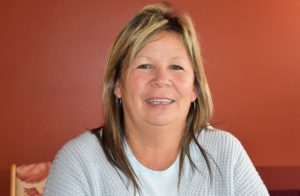Waabnoong Bemjiwang Child Well-Being working to bring kids home

By Kelly Anne Smith
DOKIS FIRST NATION–Waabnoong Bemjiwang Child Well-Being will soon have the people and resources in place to keep children home in their own First Nations for care.
The child well-being agency held a celebration in Sudbury for their first year journey and to announce the next stage. Executive Director Joanne Koehler talked of becoming designated to deliver child welfare services to seven First Nations.
Now based in Dokis First Nation, Waabnoong Bemjiwang Child Well-Being will be a conducting a feasibility study to determine where the permanent head office will be located. Executive Director Koehler explains the agency completed stage A of the ministry requirements towards designation.
“Stage A was about community readiness towards designation and if the communities are supporting moving forward.”
A member of Batchewana First Nation, Koehler consulted with each community as a whole and then met separately with the youth and Elders from each community. During the consultations there were a lot of questions about what it would mean to have Indigenous child well-being services.
“The consultations showed overwhelming support of us moving forward with our own agency to support children and families in the seven communities.”
Koehler says she was particularly saddened listening to Elders talk about the history of child welfare in their communities.
“They voiced their opinions and concerns why the mainstream children’s aid societies are not working for them. It wasn’t one community specifically, but it was seven communities. The Elders spoke about their experiences of residential school. A lot of them spoke about being apprehended very young and leaving their communities. Some didn’t see their community until they were in their 40s. A lot of them lost track of their siblings.”
Some of them didn’t know they were First Nation. They were taken at a young age and either placed in a foster home or adopted out. The people that either fostered them or adopted them didn’t tell them they were First Nation. That in itself is very sad.
Koehler says it’s upsetting that First Nations all across Canada have similar stories. Recently she was concerned with news of children taken to Indigenous hospitals and never coming home.
“A lot of people don’t even know about it. There is the Sixties Scoop and the Residential Schools. When I talk about it with different people, a lot of non-Native people say they get tired of hearing the same old thing. But it’s so interconnected to place us where we are today in Canada as First Nation People. We didn’t just start here. We evolved from hundreds of years ago, but the influence of colonialism brought us to where we are today with the Elders loss of identity for decades and decades. They are just finding their way home.”
Koehler says it will take three years to have First Nations agencies ready.
“As we move forward, we won’t be delivering child care services right away but we will be seeking out a foster care license so we can open our own First Nations foster homes. When we are designated, we will be delivering child protection services.”
Waabnoong Bemjiwang Child Well-Being expects to increase staff from the current three people this year.
“We will be looking at bringing on someone to deliver cultural services. We will also be looking to bring someone on to work in customary care.”
Customary care involves children being placed within the community, not just family members. Koehler explains customary care can prevent children from being placed in the child welfare system.
“They are placed with someone that can care for them. The big difference is there is no court so there is no clock ticking, therefore children don’t become crown wards.”
Customary care has been in legislation for a long while but the support services were not there.
“We need to lessen the number of children coming in care and look at the ones currently in care and go back to court to place them in customary care. Those kids are all in non-Native foster homes. Once we have our license, we can do our assessments and place children back in their own communities. We’ll bring them back home.”
Waabnoong Bemjiwang Child Well-Being is working to replace children aid societies servicing Dokis, Henvey Inlet, Magnetawan, Nipissing, Shawanaga, Wahnapitae, and Wasauksing First Nations.

